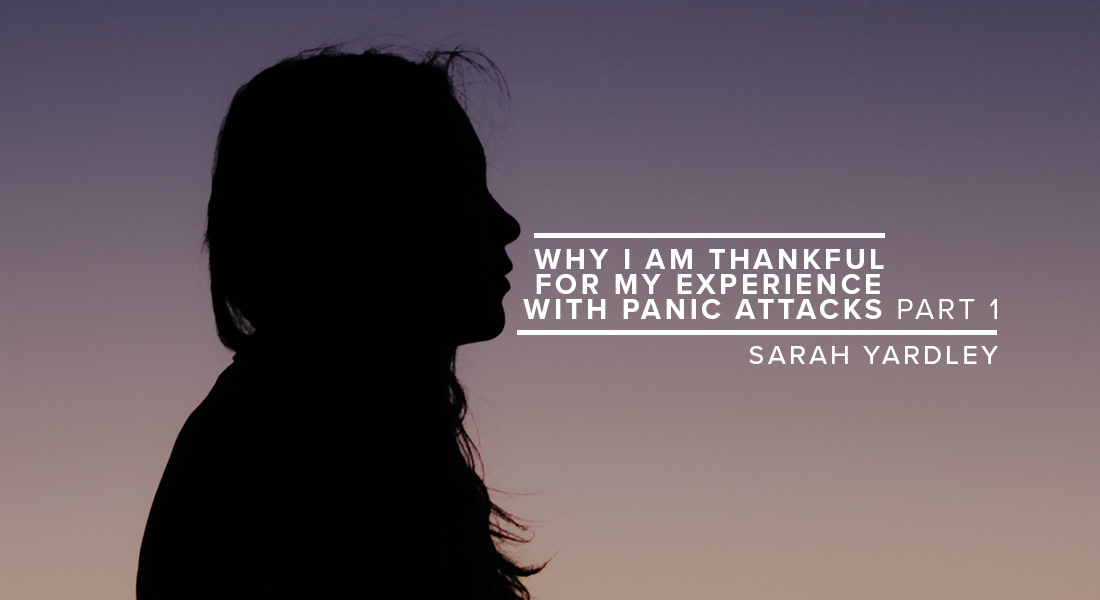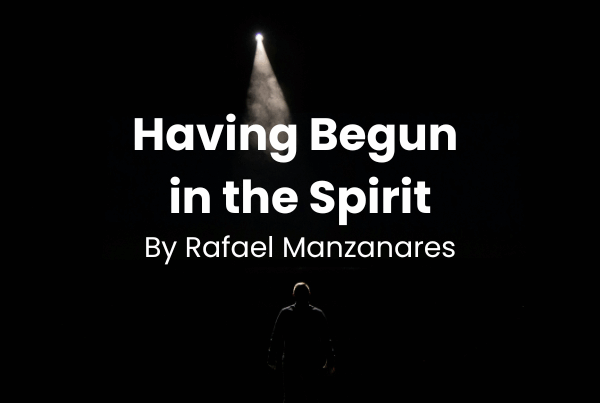
My panic attacks first started at the beginning of the summer of 2017, before I embarked on my study of theology. After 33 years of life and ministry, I had experienced mild depression, periods of distraction, weeping and grief, but never anything that deeply challenged my own mental health. The catalyst was hearing of yet another spiritual leader who had entered into moral failure. It was not the first time I had seen failure in my leaders, and it will not be the last, but this leader’s failure shook me to the core. I experienced doubts and discouragement beyond any previous period of my life. My thoughts went along these lines: If this leader has failed, then will it only be a matter of time until I fail in a significant way? And if this leader has failed, was everything they preached publicly and taught privately untrue? In the midst of these questions, I lost sight of truth. My questions and tears blurred my view of God.
After the initial grief, the panic attacks began.
It was usually when I was eating alone, always when I was overtired. For no apparent reason, often on a day that was otherwise full of joy and activity, I would end up in a moment of isolation or loneliness, and in that moment, I would lose sight of truth. Isolation turned to tears, tears turned to panic, panic turned to fear. In that instant, I would suddenly believe things that I surely know are false in the light of day. I believed that I was alone, worthless, forgotten, unloved. Our minds are strange and curious things. I discovered that mine held insecurities I never knew existed. They may have been lurking in the shadows, but in a moment, they grew in strength. They grew stronger than my faith. When my panic attacks began, I asked a few close friends to pray for me. Over the past few months, I have discovered how many have struggled with panic attacks, more than I’ve ever realized. I’m still on the journey of learning about them, although I haven’t had one since I posted about them publicly on my personal Facebook page in October of last year. Like the desert fathers and mothers, I found myself in the midst of a great struggle, but unlike their stories, my struggle and asceticism was not by choice.
During the time of my panic attacks, I looked for healing in many different ways. Speaking to trusted friends brought some relief, as their compassion extended grace to my life. A range of vitamins brought balance to my physical health. A few suggestions, including the immensely practical option of laying spread-eagled on the ground, sometimes with a book on my chest to remind me I am still grounded to earth, brought support. I engaged deeply with spiritual disciplines, including a 10-day silent retreat in Tunisia, daily study and intentional reflection on God’s Word, alongside prayer disciplines gleaned from personal friends and instructors. Prayer became more than just my petitions. Like the desert fathers and mothers, I discovered that “prayer was a continuous way of life…it was intentionally cultivated until it became second nature. Prayer involved the hard work of learning a new language – the language of heaven…the heart yearning for God, reaching out…”2
Scripture is not silent on the topic of mental health.
We read of Elijah, the great warrior prophet, who after one of his greatest spiritual victories, flees to the wilderness and asks God to take away his life (1 Kings 19:4). The Psalms continually echo with anguish, as the Psalmist prays about a life spent with sorrow, years with sighing (Psalm 31:10). Paul tells us that he “boasts of the things that show his weakness” (2 Corinthians 11:30). Despite this, in modern Christian culture, discussing panic attacks can be taboo. My embarrassment about my place of weakness made me want to cover, to hide and to put my best face forward. Most of our culture’s stereotypes about mental health lead to shame, which will always cripple. It says that if we are weak, we are worthless. If we have struggles, we should be sidelined. If we experience places of darkness, we must not be seeking the light. To quote one of my theology teachers at St. Mellitus, Rob Merchant: “Sin drives humanity into the shadows. The Creator is the one who comes into the light and asks, ‘Where are you?’ seeking relationship, not shame.”3
Within this journey, there have been five key reflections, five reasons that I can look back, and quite simply, thank God for my panic attacks. An active study of theology has informed and shaped these reflections, and experiencing the panic attacks in the midst of our spirituality module has brought rich opportunity to reflect on not only the physical challenge, but the weightier spiritual implications. It is by God’s grace I can reflect with thankfulness on my panic attacks and look at this time of pain through the lens of God’s presence rather than His absence. I write from a place of active learning, listening to the voice of the Lord, practicing the presence of God’s Spirit and expecting that growth to continue.
First, I thank God that I was not isolated in my fears and the struggles linked to it.
Not only is Christian history and tradition full of the stories of men and women who struggled with panic and depression, God’s Word is full of many of the same stories. At every corner I turned, in many social media posts, in every theology book I read, in various reflections and readings, this recurring theme of panic, fear and depression seemed boldly highlighted. In addition to well-known historic figures like C. H. Spurgeon, Abraham Lincoln and others who struggled with depression, I encountered the writings of legendary missionary C. T. Studd, who articulated his journey on the mission field in China in this way: “My heart seems worn out and bruised beyond repair, and in my deep loneliness I often wish to be gone.”4 This companionship of suffering encouraged me to face my questions with boldness, expectant that there was a way God would speak to me in the midst of this battle. In the words of modern author, John Mark Comer, “My take on depression is that it’s more of a symptom than a disease. That something in your life is causing the depression…what’s underneath the depression? The root under the ground?”5
Second, I thank God for using this journey to develop an active humility.
Finding the root and digging into the pain was not an easy process. It required (and still requires) an ongoing vulnerability, an unrelenting honesty about my own weakness, and a willingness to lay my pain and shame into the open, before God first and others second. Most of my adult life, I have been surrounded by friends and family who loved me, but journeying in humility through my pain and questions required a necessary solitude. It was in the spaces where my soul was still before God that I began to find healing for the deeper questions that triggered my panic. Solitude became a space for my soul to experience the deeper presence of God, and the words of Henri Nouwen became true in my own life. He writes:
“Solitude is the garden for our hearts, which yearn for love. It is the place where our aloneness can bear fruit. It is the home for our restless bodies and anxious minds … Solitude is not immediately satisfying, because in solitude we meet our demons, our addictions, our feelings of lust and anger, and our immense need for recognition and approval. But if we do not run away, we will meet there also the One who says, ‘Do not be afraid. I am with you, and I will guide you through the valley of darkness.'”6
I find that in many ways, the journey continues. This post shares an introduction, and my next post will give three further reflections on God’s grace and kindness in the midst of my experience with panic attacks. I’d love to hear from you. Comment on my article post shared on the CalvaryChapel.com Facebook account. Have you had similar experiences? And how has God revealed Himself in yours?
1 See Facebook post below on 10 October, 2017.
2 Laura Swan, The Forgotten Desert Mothers: Sayings, Lives and Stories of Early Christian Women (Mahway, NJ: Paulist Press, 2001) 27.
3 As quoted in class on Tuesday, 10 October at St. Mellitus SouthWest Plymouth campus.
4 Norman Grubb, C. T. Studd (Fort Washington, PA: CLC, 1982), 144.
5 John Mark Comer, Garden City: Work, Rest, and the Art of Being Human (Grand Rapids, MI: Zondervan, 2015), 18.
6 Henri Nouwen, Bread for the Journey (San Francisco, CA: Harper San Francisco, 1997), 26.






